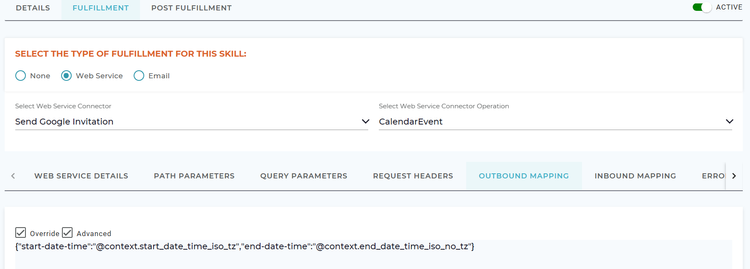The skills builder user can format the date fields which are captured in various human readable formats at context such as today, tomorrow, and so on, while pushing the data and also while retrieving the data in response.
For example, if you are scheduling a meeting through Luma and specify "schedule a meeting tomorrow at a specific time" followed by your email address, your calendar will be marked on the specific date and time even if you don't mention the date as 28/11/2018. But if you don't mention the time, by default, 11:30 IST will be captured.
Following attributes are available to manage the date format:
...
Overview
A skills builder user can capture a date in various formats including Epoch and translate it in a user-friendly manner.
The following strings are available automatically on any attribute with a date_time data type. These strings help translating dates that were either specified by a user or from a web service. This is useful for displaying a date back to a user or passing a date to another web service in the required format.
- <attribute_idenitifier>_iso_tz
- <attribute_idenitifier>_iso_no_tz
Example:
The Attribute Name is MeetingDate and has a Data Type of DATE_TIME
The supported date format is Epoch format (1560576600). The following strings are available automatically and can be used in responses or in API calls in the Outbound Mapping section to support:
ISO with time zone:
MeetingDate_iso_tz -> ISO 8601 format with timezone (2019-06-15T11:00:00+05:30)
ISO without time zone:
MeetingDate_iso_no_tz -> ISO 8601 format without timezone (2019-06-15T11:00:00)
Usage in the text response:
Configuration string in a skill:
Here is the date in epoch: @context.MeetingDate and in ISO 8601 format: @context.MeetingDate_iso_tz and iso without timezone format: @context.MeetingDate_iso_no_t'.
Text response displayed to the end-user with actual values:
Here is the date in epoch: 1560576600 and in ISO 8601 format: 2019-06-15T11:00:00+05:30 and iso without timezone format: 2019-06-15T11:00:00
